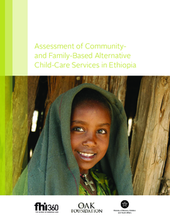This assessment conducted by FHI 360, with support from Ethiopia's Ministry of Women, Youth and Children Affairs (MoWYCA) and the OAK Foundation aimed to generate evidence about formal community and family- based alternative child care services and service providing agencies in Ethiopia, with a particular focus on magnitude, quality and quality-assurance mechanisms. The assessment was conducted in five selected regions (Addis Ababa; Afar; Amhara; Oromia; and Southern Nations, Nationalities and Peoples Region (SNNPR). The research found that most if not all formal family-based alternative care and community-based alternative child-care services are concentrated in Addis Ababa and other urban centres, leaving the majority of needy children in rural areas with little access to these services. According to the authors, the imbalance in the concentration of the institutions could be attributed to the sheer demand for services in Addis Ababa and other urban centres, but also to the motive of the organizations to be located in the city, where there is more ease of operation, access to different social and economic services and available qualified personnel. Only about half of the agencies providing community-based child-care services claimed to include services for children with special needs or disabilities. The distribution of agencies by type of service they provide suggests alignment with the principle of continuum of care, which emphasizes the availability of services preventing unnecessary separation of children and placing children in familial environments as much as possible. Nine in every 10 institutions provide community- based/Family Preservation Services (FPS). Overall economic strengthening and educational support were the most popular FPS, reported by 87.3% and 85.5% of the institutions, respectively. The second most popular categories of services include provision of health care (69.7%), parenting skills and competencies (55.8%), food/nutrition (57%), and psychosocial support (57.6%).
In terms of family-based alternative care services, reunification was the most prevalent service reportedly provided by about half of the agencies (44.5%), and foster care placement was reportedly provided by 11% of the institutions. Adoption placement was the second most popular family-based alternative care service provided by close to two-fifths of the institutions, with the proportion of such institution being far more in Addis Ababa than the combined proportion for the other regions (48.7% and 31.7%). The vast majority of the organizations provide inter-country adoption alone. Only 29.6% combine inter-country and domestic adoption. The low uptake of formal local adoption was attributed to various barriers including lack of awareness about formal procedures on domestic adoption and misconceptions, reluctance to face legal procedure in particular in relation to the issue of inheritance, cultural reasons, fear of stigma and labelling, and economic problems. Discussion with community representatives, though, indicated that informal adoptions are common.
The report makes a number of important recommendations, including to improve the capacity of MOWCYA and its substructures to provide adequate support and supervision of agencies that provide formal alternative child-care services. It also suggests that while currently formal domestic adoption and foster care are the least popular forms of care, there is untapped capacity in this regard, and innovative ways to promote these care options should be introduced. It calls for research on the state of children under informal care, and the implications of formalizing informal/traditional family-based child-care options on the well-being of children, and readiness of families to provide support and care to OVC.
©FHI 360s, the Federal Democratic Republic of Ethiopiaâs Ministry of Women, Youth and Children Affairs (MoWYCA), the OAK Foundation

